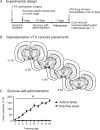Muscarinic, but not nicotinic, acetylcholine receptor blockade in the ventral tegmental area attenuates cue-induced sucrose-seeking
- PMID: 26026787
- PMCID: PMC4497829
- DOI: 10.1016/j.bbr.2015.05.036
Muscarinic, but not nicotinic, acetylcholine receptor blockade in the ventral tegmental area attenuates cue-induced sucrose-seeking
Abstract
The mesolimbic dopamine (DA) system is known to play a role in cue-mediated reward-seeking for natural rewards and drugs of abuse. Specifically, cholinergic and glutamatergic receptors in the ventral tegmental area (VTA) have been shown to regulate cue-induced drug-seeking. However, the potential role of these VTA receptors in regulating cue-induced reward seeking for natural rewards is unknown. Here, we examined whether blockade of VTA acetylcholine receptors (AChRs) and N-methyl-d-aspartate receptors (NMDARs) would alter cue-induced sucrose seeking in male Sprague-Dawley rats. Subjects underwent 10 days of sucrose self-administration training (fixed ratio 1 schedule) followed by 7 days of forced abstinence. On withdrawal day 7, rats received bilateral VTA infusion of vehicle, the muscarinic AChR antagonist scopolamine (2.4 or 24 μg/side), the nicotinic AChR antagonist mecamylamine (3 or 30 μg/side), or the NMDAR antagonist AP-5 (0.1 or 1 μg/side) immediately prior to examination of cue-induced sucrose-seeking. Scopolamine infusion led to robust attenuation, but did not completely block, sucrose-seeking behavior. In contrast, VTA administration of mecamylamine or AP-5 did not alter cue-induced sucrose-seeking. Together, the data suggest that VTA muscarinic AChRs, but not nicotinic AChRs nor NMDARs, facilitate the ability of food-associated cues to drive seeking behavior for a food reward.
Keywords: Mecamylamine; Mesolimbic dopamine system; NMDA receptor; Reward-seeking behavior; Scopolamine.
Copyright © 2015 Elsevier B.V. All rights reserved.
Figures


References
-
- Rohsenow DJ, Niaura RS, Childress AR, Abrams DB, Monti PM. Cue reactivity in addictive behaviors: theoretical and treatment implications. Int J Addict. 1990;25:957–93. - PubMed
-
- See RE. Neural substrates of cocaine-cue associations that trigger relapse. Eur J Pharmacol. 2005;526:140–6. - PubMed
-
- Lof E, Olausson P, deBejczy A, Stomberg R, McIntosh JM, Taylor JR, et al. Nicotinic acetylcholine receptors in the ventral tegmental area mediate the dopamine activating and reinforcing properties of ethanol cues. Psychopharmacology (Berl) 2007;195:333–43. - PubMed
-
- Shaham Y, Hope BT. The role of neuroadaptations in relapse to drug seeking. Nat Neurosci. 2005;8:1437–9. - PubMed
Publication types
MeSH terms
Substances
Grants and funding
LinkOut - more resources
Full Text Sources
Other Literature Sources

